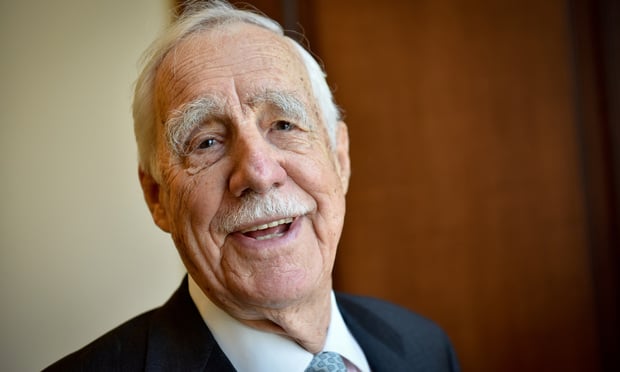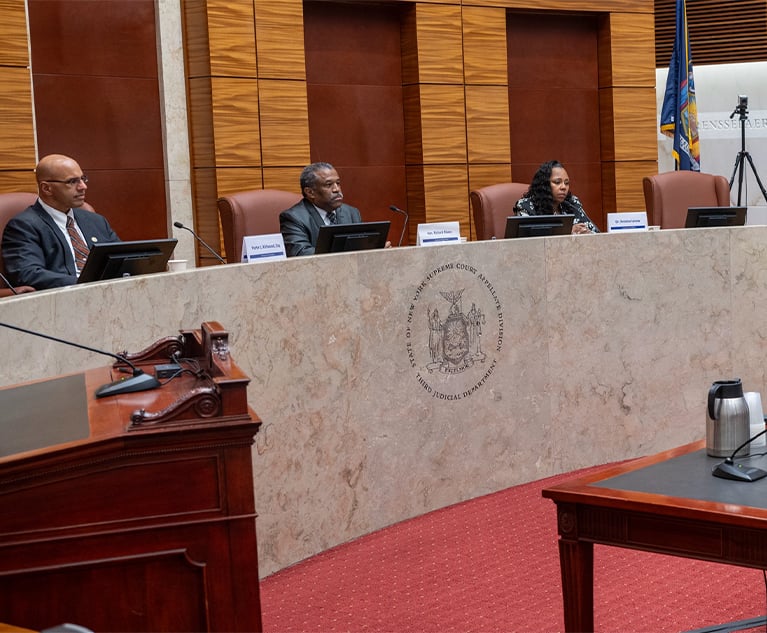Federal Judge Dismisses Harassment Claims Against Ex-Cuomo Administration Official
The case was largely the impetus for state lawmakers to pass a set of reforms aimed at curbing sexual harassment during last year's legislative session.
February 05, 2019 at 05:36 PM
5 minute read
 Judge Robert Sweet. Photo by David Handschuh/NYLJ
Judge Robert Sweet. Photo by David Handschuh/NYLJ
A federal judge has dismissed allegations of sexual harassment levied against a former state official and the state agency he worked at, writing that his accuser waived her ability to sue over the claims in an agreement made more than two years ago.
U.S. District Judge Robert Sweet of the Southern District of New York wrote in two decisions this week that Lisa Marie Cater, a former state employee, could not levy the claims against the state and Samuel Hoyt, a former Cuomo administration official, because she agreed to forego future legal action in the settlement.
The case provided in large part the impetus for state lawmakers to pass a set of reforms aimed at curbing sexual harassment during last year's legislative session.
Hoyt, a former Assemblyman hired to lead Gov. Andrew Cuomo's economic development efforts in Buffalo, was accused in the lawsuit of sexually harassing Cater between 2015 and 2017. Cater worked at the state Department of Motor Vehicles for part of that time. Hoyt has claimed that their relationship was consensual, while Cater said his behavior was uninvited.
She claimed that Hoyt harassed her in a variety of ways, like sending her explicit photos, attempting to communicate with her at night, and visiting her at home. Cater said when she rebuffed Hoyt's advances, he became “increasingly aggressive” and threatened to use his position to have her fired.
Cater claimed she tried several different avenues to report Hoyt for the alleged harassment. She said she tried to make direct contact with the governor's office and the Joint Commission on Public Ethics, the state's ethics watchdog for lobbyists and public officials. Cater claimed that Hoyt told her he was “too powerful” and in “direct contact with the governor.”
She hired Lindy Korn, a discrimination law attorney in Buffalo, to send Hoyt a demand letter for $350,000 over the claims. Hoyt, instead, offered her $50,000 and asked her to sign an agreement that stated she would not bring future claims against him of discrimination or sexual harassment.
According to Sweet's decision, the agreement specifically said Cater waived “all claims and potential claims of any kind” against Hoyt, including claims for discrimination, harassment or retaliation.
Sweet wrote that since Cater signed the agreement and accepted the payment from Hoyt, her lawsuit didn't hold water.
“Plaintiff ratified the settlement agreement by accepting $50,000 in exchange for waiving her potential claims against Hoyt and agreeing not to disparage him. She then brought this action without first repaying or offering to repay that consideration,” Sweet wrote. “Plaintiff cannot have it both ways.”
Sweet also dismissed other parts of the lawsuit from Cater where she claimed Hoyt used his power as a higher-ranking public worker to intimidate and harass her, such as when he allegedly threatened to have her fired. Sweet said those claims were invalid because Hoyt had no authority over Cater, who worked in a different state agency.
Cater had also sued Empire State Development, a state agency, because she claimed officials knew about the alleged harassment but did nothing to help her. The Cuomo administration has denied those claims.
Sweet dismissed her claims against the agency in a separate decision, in which he said Cater had not provided proof to support the allegations.
“Plaintiff offers only conclusory assertions than an unlawful conspiracy existed and alleges nothing to suggest ESD was part of any such conspiracy,” Sweet wrote. “These broad and conclusory allegations of conspiracy—supported only by her claim her complaints were ignored —comprise precisely the sort of [civil rights law] claim courts have dismissed as implausible.”
Cater had originally also included Cuomo on the lawsuit, but her claims against him were dismissed by Sweet in a decision last year. He wrote in the decision that there was no evidence that showed Cuomo had any direct knowledge of the alleged harassment.
Hoyt served as the regional president of Empire State Development from 2011 until he resigned abruptly in October 2017, one month before Cater filed the lawsuit against him. He was represented by Carrie Cohen and Katie Viggiani from Morrison & Foerster.
Cater is represented by Rachel Allen, an employment attorney with the Derek Smith Law Group in Manhattan. Allen did not immediately return a call for comment on the decision.
Efforts to reach Hoyt for comment were unsuccessful.
READ MORE:
New York, New York! Taking the Lead to Combat Sexual Harassment in the Workplace
NY Releases New Draft Sexual Harassment Prevention Policy for Employers
Five Things Employers Must Know About NY's New Anti-Sexual Harassment Laws
This content has been archived. It is available through our partners, LexisNexis® and Bloomberg Law.
To view this content, please continue to their sites.
Not a Lexis Subscriber?
Subscribe Now
Not a Bloomberg Law Subscriber?
Subscribe Now
NOT FOR REPRINT
© 2025 ALM Global, LLC, All Rights Reserved. Request academic re-use from www.copyright.com. All other uses, submit a request to [email protected]. For more information visit Asset & Logo Licensing.
You Might Like
View All

Law Firms Expand Scope of Immigration Expertise Amid Blitz of Trump Orders
6 minute read
'Reluctant to Trust'?: NY Courts Continue to Grapple With Complexities of Jury Diversity
Trending Stories
- 1Uber Files RICO Suit Against Plaintiff-Side Firms Alleging Fraudulent Injury Claims
- 2The Law Firm Disrupted: Scrutinizing the Elephant More Than the Mouse
- 3Inherent Diminished Value Damages Unavailable to 3rd-Party Claimants, Court Says
- 4Pa. Defense Firm Sued by Client Over Ex-Eagles Player's $43.5M Med Mal Win
- 5Losses Mount at Morris Manning, but Departing Ex-Chair Stays Bullish About His Old Firm's Future
Who Got The Work
J. Brugh Lower of Gibbons has entered an appearance for industrial equipment supplier Devco Corporation in a pending trademark infringement lawsuit. The suit, accusing the defendant of selling knock-off Graco products, was filed Dec. 18 in New Jersey District Court by Rivkin Radler on behalf of Graco Inc. and Graco Minnesota. The case, assigned to U.S. District Judge Zahid N. Quraishi, is 3:24-cv-11294, Graco Inc. et al v. Devco Corporation.
Who Got The Work
Rebecca Maller-Stein and Kent A. Yalowitz of Arnold & Porter Kaye Scholer have entered their appearances for Hanaco Venture Capital and its executives, Lior Prosor and David Frankel, in a pending securities lawsuit. The action, filed on Dec. 24 in New York Southern District Court by Zell, Aron & Co. on behalf of Goldeneye Advisors, accuses the defendants of negligently and fraudulently managing the plaintiff's $1 million investment. The case, assigned to U.S. District Judge Vernon S. Broderick, is 1:24-cv-09918, Goldeneye Advisors, LLC v. Hanaco Venture Capital, Ltd. et al.
Who Got The Work
Attorneys from A&O Shearman has stepped in as defense counsel for Toronto-Dominion Bank and other defendants in a pending securities class action. The suit, filed Dec. 11 in New York Southern District Court by Bleichmar Fonti & Auld, accuses the defendants of concealing the bank's 'pervasive' deficiencies in regards to its compliance with the Bank Secrecy Act and the quality of its anti-money laundering controls. The case, assigned to U.S. District Judge Arun Subramanian, is 1:24-cv-09445, Gonzalez v. The Toronto-Dominion Bank et al.
Who Got The Work
Crown Castle International, a Pennsylvania company providing shared communications infrastructure, has turned to Luke D. Wolf of Gordon Rees Scully Mansukhani to fend off a pending breach-of-contract lawsuit. The court action, filed Nov. 25 in Michigan Eastern District Court by Hooper Hathaway PC on behalf of The Town Residences LLC, accuses Crown Castle of failing to transfer approximately $30,000 in utility payments from T-Mobile in breach of a roof-top lease and assignment agreement. The case, assigned to U.S. District Judge Susan K. Declercq, is 2:24-cv-13131, The Town Residences LLC v. T-Mobile US, Inc. et al.
Who Got The Work
Wilfred P. Coronato and Daniel M. Schwartz of McCarter & English have stepped in as defense counsel to Electrolux Home Products Inc. in a pending product liability lawsuit. The court action, filed Nov. 26 in New York Eastern District Court by Poulos Lopiccolo PC and Nagel Rice LLP on behalf of David Stern, alleges that the defendant's refrigerators’ drawers and shelving repeatedly break and fall apart within months after purchase. The case, assigned to U.S. District Judge Joan M. Azrack, is 2:24-cv-08204, Stern v. Electrolux Home Products, Inc.
Featured Firms
Law Offices of Gary Martin Hays & Associates, P.C.
(470) 294-1674
Law Offices of Mark E. Salomone
(857) 444-6468
Smith & Hassler
(713) 739-1250







